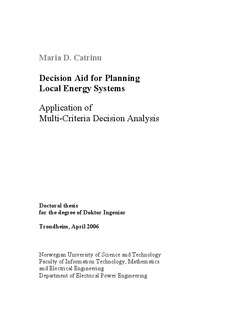| dc.description.abstract | Planning is what sustains an energy system. It is a process of analysis and ongoing decision making about what resources and energy technologies to use when supplying energy to society. This research focuses on integrated energy systems, i.e. systems that are comprised of several energy carriers – electricity, gas, hot water - and energy distribution networks. The planning of these kinds of systems is a complex process, influenced by many factors, among which the most important are the availability of energy resources and the competition between different energy carriers in satisfying energy demand. During the last 10-20 years significant changes have taken place on the world energy scene, which have important implications for energy planning. Two main factors have triggered these changes. The first factor is the immediate need to address environmental changes or more generally, to take measures that are sustainable in the long run. Sustainability can be defined in many ways and in relation to different issues such as economic and ecologic development, reduction of greenhouse gases, responsible use of natural resources, social equity, etc. In recent years, an increased awareness of these issues has been observed at all levels of the society. The second factor is the deregulation of national energy sectors in more than 50 countries. This process brought changes in the ownership of different parts of the formerly integrated energy systems. New business opportunities were created in power generation, wholesale power/gas trading and energy retailing, while the energy infrastructures remained state owned or/and under regulatory control. The newly created energy markets (many of them international) have attracted both new players (power, oil and gas companies and financial institutions) together with the old ones (integrated utilities). In parallel with this vertical separation of national energy sectors, recent studies have shown a tendency for horizontal integration at the regional/company level. For instance, in order to reduce their overall business risk, companies prefer to participate in several segments of the energy value chain (in both regulated and non-regulated activities), and often across more than one fuel commodity, such as gas and electricity or district heating. In this context, the competition between different energy carriers in satisfying the end-use energy demand became obvious in economic as well as in technological and environmental terms. Traditionally, in integrated planning, this competition did not play a big role, since the same state entity made decisions at both national and regional levels. However, in the post-deregulation era it is no longer obvious who the planner is. In many cases, planning decision at local levels involve at least three main interest groups: energy companies (and/or other investors), the state and the local community. This thesis is motivated by the need to help planners to cope with the changes in concepts and values concerning the planning of local energy supply systems. This thesis has two aims. The first aim is to improve the understanding of what planning of local systems implies and how such a process can be structured. The second aim is to contribute to the development of decision support methodologies and tools that can cope with the needs in planning. For this purpose, the use of energy modelling and Multi- Criteria Decision Analysis has been studied. | nb_NO |
